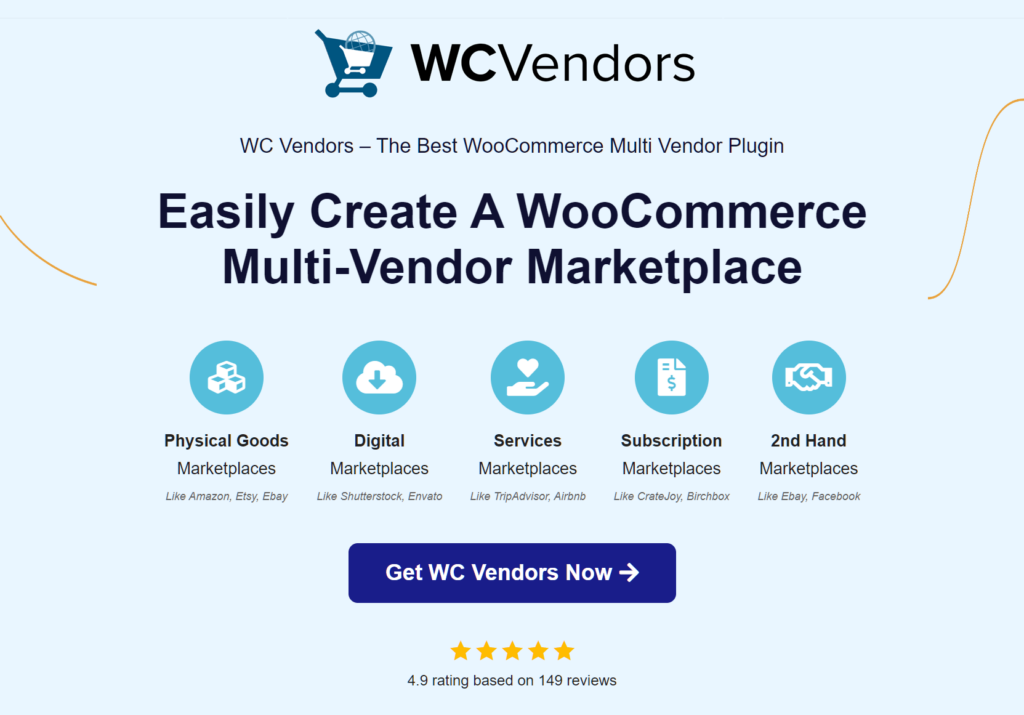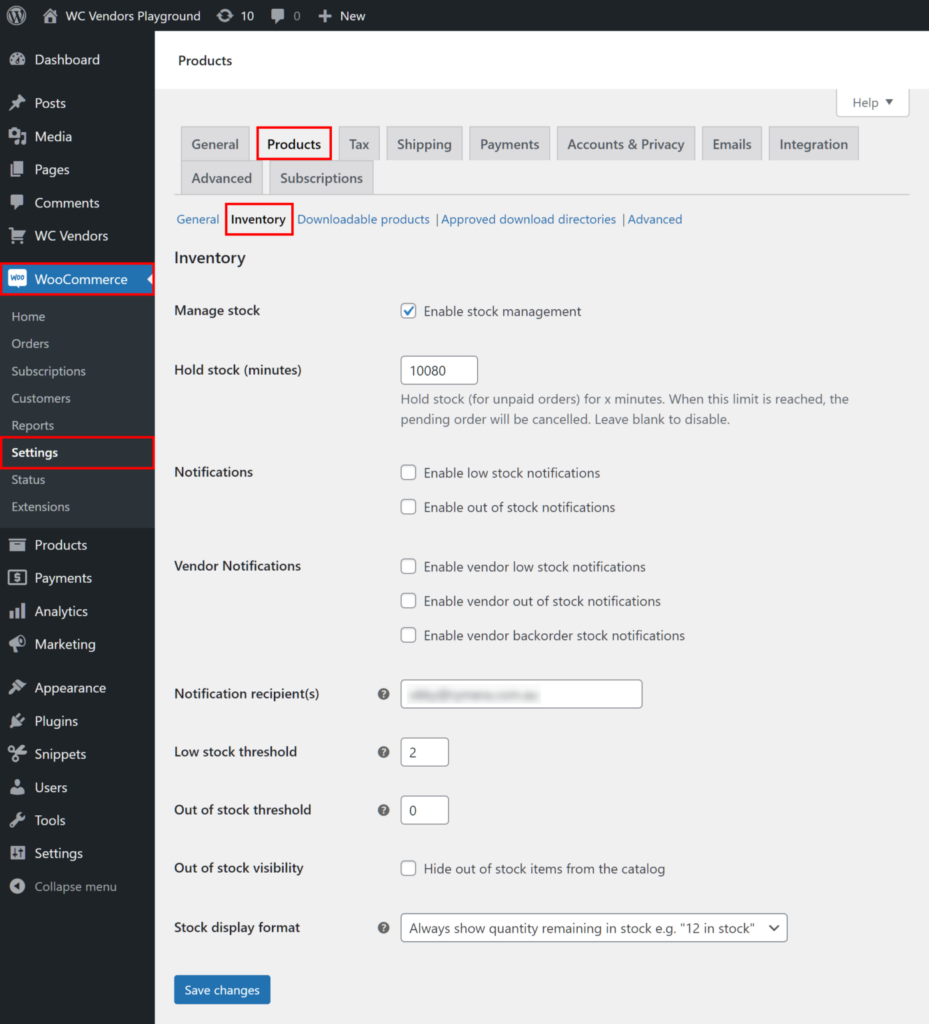
Marketplace efficiency is vital for vendors aiming for success through well-managed daily operations. With the right set of tools, you can streamline various aspects of your business, from inventory management to customer service.
This comprehensive guide highlights essential tools that can boost marketplace efficiency for vendors, specifically focusing on reducing wasted time and resources to allow more growth opportunities for your business.
Let’s explore how integrating these tools with WC Vendors can elevate the functionality of your online marketplace. So let’s begin!
The Importance Of Marketplace Efficiency Tools for Vendors
In today’s digital marketplace, heightened customer expectations demand quality products, quick service, and prompt communication. For vendors on platforms like WC Vendors, achieving marketplace efficiency is key to meeting these needs effectively. Furthermore, leveraging efficiency tools is essential, as they automate tasks, reduce errors, and improve decision-making through data analytics.
Firstly, the primary benefit of these efficiency tools is significant time savings. By automating processes like inventory management and order processing, vendors can shift their focus to strategic tasks. These include market research and product development. Additionally, these tools offer scalability. This means marketplace vendors can manage more business without a substantial increase in workload or operational costs.
Moreover, in a competitive marketplace setting, the speed and quality of service can distinguish one vendor from another. Efficiency tools not only speed up operations but also improve accuracy. This includes accuracy in order fulfilment, stock updates, and customer service. Furthermore, the insights provided by data analytics tools are invaluable. They help vendors understand market trends and customer preferences, enabling informed business decisions.
Overall, the combination of time savings, scalability, better service quality, and valuable insights makes these tools indispensable for marketplace efficiency. Indeed, they are crucial for vendors who want to secure their place and thrive in the competitive online marketplace, and WC Vendors provides a comprehensive solution to achieve this.
7 Efficiency Tools Vendors Need For Smooth Marketplace Operations
Managing the challenges of selling in online marketplaces requires good organization for vendors to succeed. There are important tools that make complicated tasks easier and help businesses run more smoothly. Below are the seven efficiency tools you need to know:
1. Inventory management
Basically, maintaining an accurate and real-time inventory is vital for marketplace efficiency, allowing vendors to ensure customer satisfaction and avoid issues like over-selling.
Inventory Management is a key player in this field, providing a powerful dashboard for complete management of stock levels. Additionally, it integrates smoothly with WooCommerce, proving to be an ideal partner for WC Vendors users looking to simplify their inventory management seamlessly.
- Key advantage: Real-time inventory control is crucial. ATUM offers a powerful dashboard for marketplace vendors, ensuring stock levels are accurately maintained, avoiding the common pitfall of overselling.
- How it integrates: Seamlessly connects with WooCommerce, and also simplifies inventory tasks for vendors.
- Cost: ATUM offers a free version that includes the core features needed for effective inventory management. For advanced functionalities, vendors can opt for the paid version, ensuring they have access to additional tools and options to further optimize their inventory control.
2. Customer relationship management
Establishing and maintaining strong customer relationships is key! Therefore, integrating a dedicated Customer Relationship Management (CRM) system into your WooCommerce dashboard can make a significant impact.
Key advantage: Strong customer relationships drive loyalty and marketplace efficiency. Consequently, these CRM tools can be directly integrated into your WooCommerce dashboard, allowing marketplace vendors to manage customer data and interactions efficiently, fostering better customer engagement.
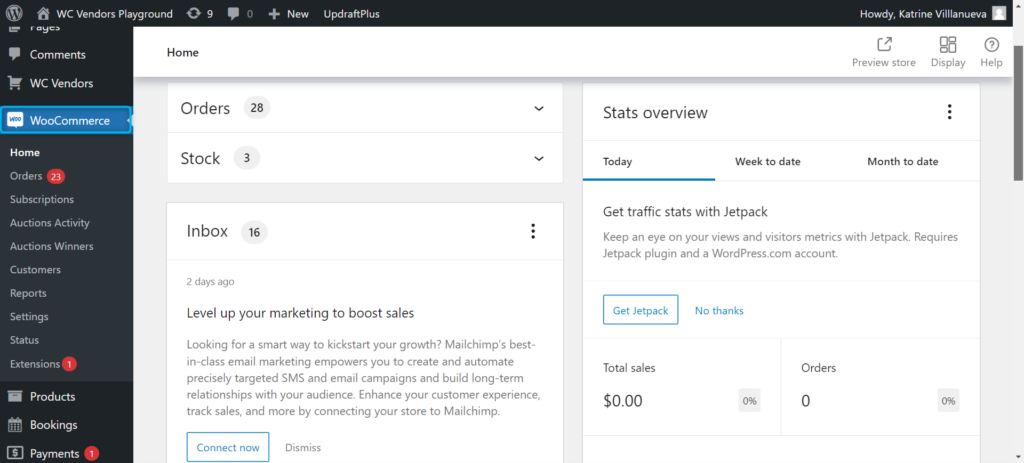
Several popular CRM tools that seamlessly integrate with WooCommerce include:
- Salesforce: A powerful CRM that offers comprehensive features for managing customer information, sales, marketing, and customer service interactions. Salesforce offers various pricing tiers starting with the Essentials plan at $25 per user per month (billed annually). There is no free version of Salesforce, but they do offer a trial period.
- HubSpot: Known for its inbound marketing prowess, HubSpot also offers a robust CRM system that helps marketplace vendors attract, engage, and delight customers. HubSpot CRM offers a free version with basic features. For advanced functionalities, pricing begins at $45 per month (billed annually) under the Starter Plan.
- Monday.com: While primarily a project management tool, Monday.com offers CRM capabilities that allow for the tracking of customer interactions and sales pipelines. Monday.com offers different subscription levels starting with the Basic plan at $8 per seat per month (billed annually). A free 14-day trial is available, but there is no permanently free plan.
- Zoho CRM: Offers a suite of tools to manage your sales, marketing, contacts, and customer support functions, all of which integrate well with WooCommerce. Zoho CRM has a free version for up to three users. Paid plans start at $14 per user per month (billed annually) for the Standard edition.
3. Order fulfillment
Efficient order fulfillment is another cornerstone of a successful marketplace, with customer expectations around delivery speed and accuracy higher than ever.
The WooCommerce Order Status Manager plugin enables vendors to customize and streamline the order process, from placement to delivery, enhancing marketplace efficiency. Additionally, by ensuring that each step of the order fulfillment process is transparent and manageable, marketplace vendors can significantly improve the shopping experience for their customers.
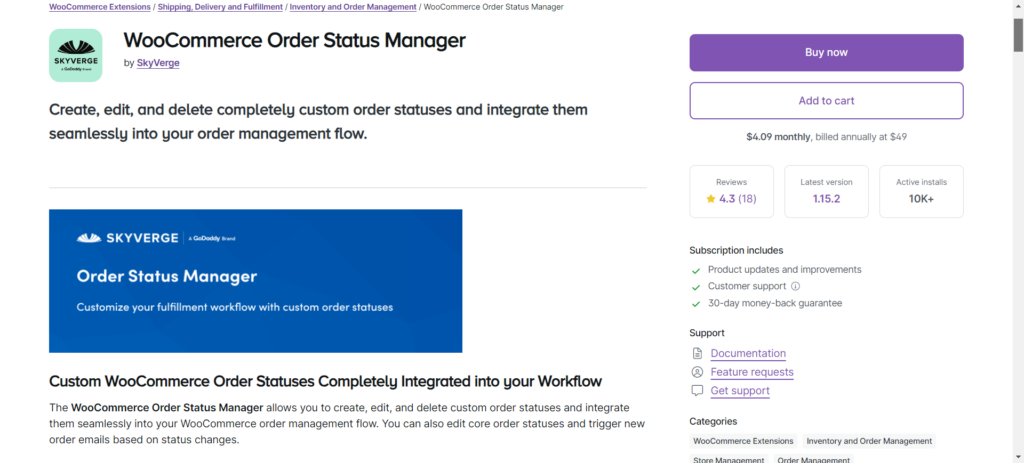
- Key advantage: With rising customer expectations around delivery, this tool aids marketplace vendors in customizing the order process, enhancing transparency, and improving the overall shopping experience, directly contributing to marketplace efficiency.
- Cost: The plugin’s price is $49 for a single-site license. It’s important to note that there is no free version available for this particular plugin; it requires a purchase for use.
4. Data analysis and reporting
For vendors, understanding the performance of your operation is indispensable for ensuring marketplace efficiency. Furthermore, Metorik for WooCommerce offers deep insights and analytics, providing a clear view of essential the metrics like sales trends, customer behavior, and product performance.
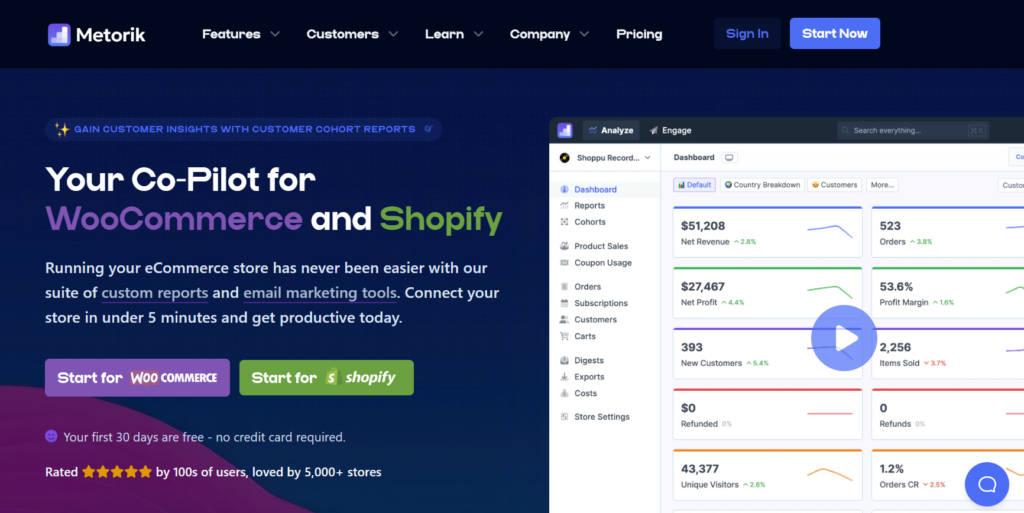
- Key advantage: Provides marketplace vendors with in-depth insights into sales trends and product performance. Additionally, it empowers them with data to make informed decisions.
- Cost: Metorik operates on a tiered pricing model starting at $20 per month for stores with up to 100 orders per month. The cost increases based on the number of orders processed, intended to scale with your business. Additionally, Metorik offers a 30-day free trial for new users.
Armed with this data, vendors can make informed decisions that drive growth and efficiency, thus ensuring they stay ahead in the competitive online retail space.
5. Team communication
Communication is the backbone of any smoothly running operation, and this holds especially true for online marketplaces.
Slack, a communication platform, enhances team collaboration through instant messaging, file sharing, and integration with numerous third-party apps. Moreover, for marketplace vendors, integrating Slack means ensuring that your team members are always in sync, enhancing productivity and operational efficiency, thereby contributing to marketplace efficiency.
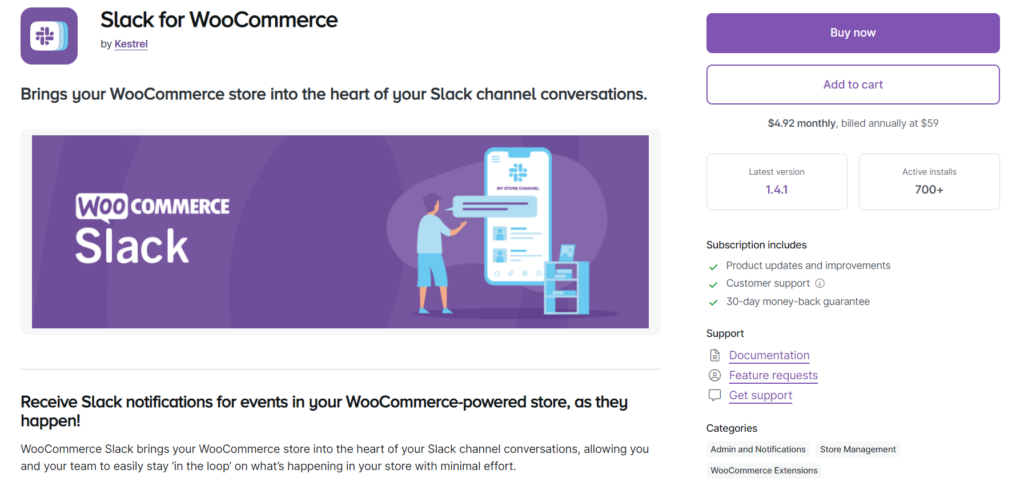
- Key advantage: Keeps the communication clear and ongoing among team members. Also, it ensures productivity and operational efficiency for marketplace vendors.
- Cost: Slack offers a free version with limited functionalities which can be sufficient for small teams or for evaluation purposes. Additionally, for extended features and capabilities, Slack has paid plans starting at $7.25 per user per month (billed annually) under the Pro plan.
6. Financial management
Streamlining financial management is also critical for marketplace vendors. The integration of QuickBooks Online with WooCommerce automates the transfer of transaction data, simplifying bookkeeping tasks, and providing clear insights into financial health.
If you’re looking to simplify your accounting processes and reduce manual entry errors, it’s essential to Integrate WooCommerce with QuickBooks as part of your marketplace toolset.
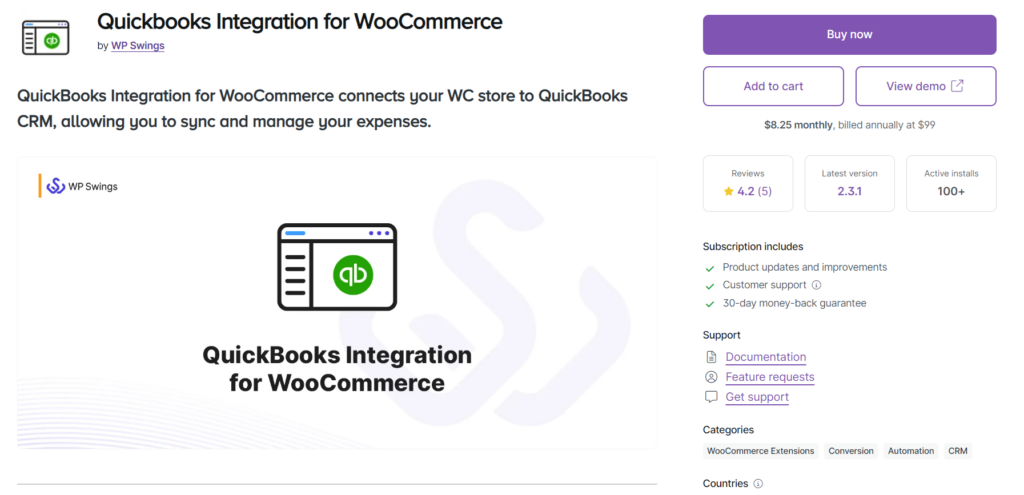
- Key advantage: Automates transaction data transfer, making bookkeeping a breeze for marketplace vendors. Integrates effortlessly with WooCommerce, providing clear financial insights.
- Cost: QuickBooks Online offers several pricing tiers to suit different business needs and sizes, starting with the Simple Start plan at $25 per month. There’s also an Advanced plan catering to larger businesses that require more sophisticated financial management tools. While QuickBooks Online doesn’t offer a free version, it frequently provides promotional discounts and a 30-day free trial.
Additionally, this simplification of financial processes allows vendors to focus more on growth strategies rather than getting bogged down by manual accounting tasks.
7. Email marketing
Finally, driving customer engagement and sales through targeted marketing efforts is crucial. Mailchimp for WooCommerce automates email marketing campaigns based on customer behavior and preferences, enabling vendors to personalize their marketing efforts.

- Key advantage: Enables personalized email marketing campaigns, driving customer engagement and repeat business for marketplace vendors.
- Cost: Mailchimp offers a free pricing plan that includes basic features suitable for small businesses or those new to email marketing. Conversely, for those who require more advanced features, Mailchimp’s paid plans start at $13 per month for the Essentials plan, $20 per month for the Standard plan, and can go as high as $350 per month for the Premium plan.
In general, this integration helps in fostering customer relationships, promoting repeat business, and increasing sales, making it an invaluable tool for marketplace vendors eager to enhance marketplace efficiency.
Why These Integrations Matter For Marketplace Vendors
When integrating these tools with WC Vendors, ensure they fulfill your specific business needs and that you’re comfortable with their functionality within the WooCommerce environment. Proper setup and potential customization may be required to effectively leverage their capabilities alongside WC Vendors.
- Inventory management: Avoid overselling and keep vendors and customers happy with real-time updates.
- Customer relations: Build stronger bonds with customers, encouraging loyalty and repeat business.
- Order fulfillment: Meet customer expectations with efficient, transparent order processes.
- Analytics: Make informed decisions with actionable insights into your marketplace’s performance.
- Team communication: Ensure your team stays on the same page, enhancing productivity.
- Financial management: Simplify financial tasks, allowing you to focus on growth.
- Email marketing: Engage customers with personalized communication, promoting sales.
By emphasizing these integrations, vendors can improve their efficiency and drive growth in the competitive online marketplace arena. Additionally, the key to success lies in leveraging these tools to their full potential, ensuring a well-organized, customer-friendly, and thriving marketplace, thereby enhancing marketplace efficiency.
Conclusion
For marketplace vendors aiming to thrive and stay competitive in the digital marketplace, the adoption of efficiency tools has become essential. Investing in the right tools not only signifies investing in the future of your business but also plays a crucial role in enhancing marketplace efficiency.
Similarly, effective marketplace inventory management is crucial for the success of your multi-vendor e-commerce platform. By keeping the right amount of products, giving vendors control, and making it easy for everyone to discuss inventory, you can make customers happier, save money, and make the whole marketplace work better.
To recap, you can streamline your operations by using the following tools:
- Inventory Management
- Customer Relationship Management
- Order Fulfillment
- Data Analysis and Reporting
- Team Communication
- Financial Management
- Email Marketing
Do you have any questions about managing your marketplace more effectively with these tools? Reach out to us and let us know; we’d be happy to hear from you!
